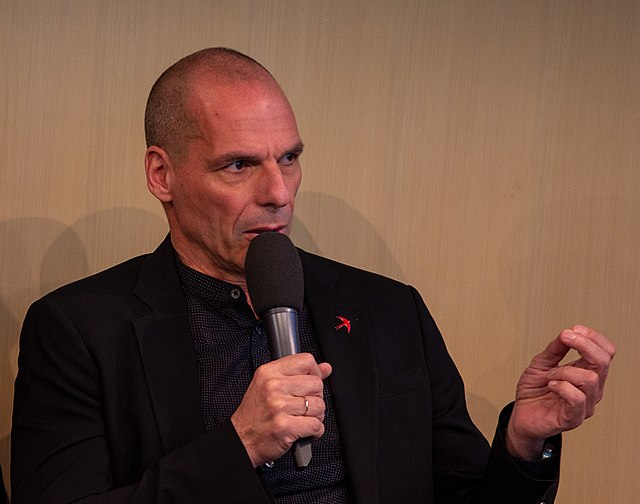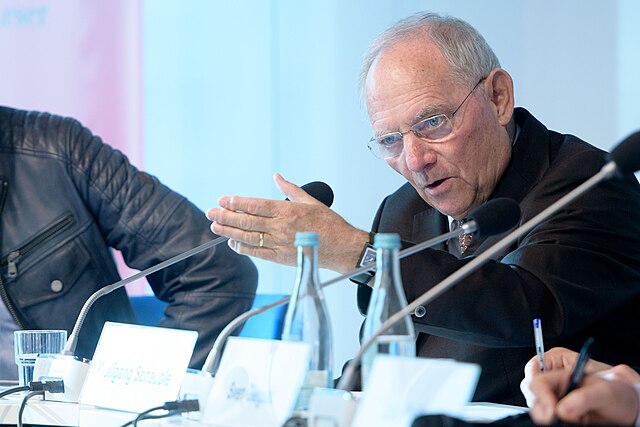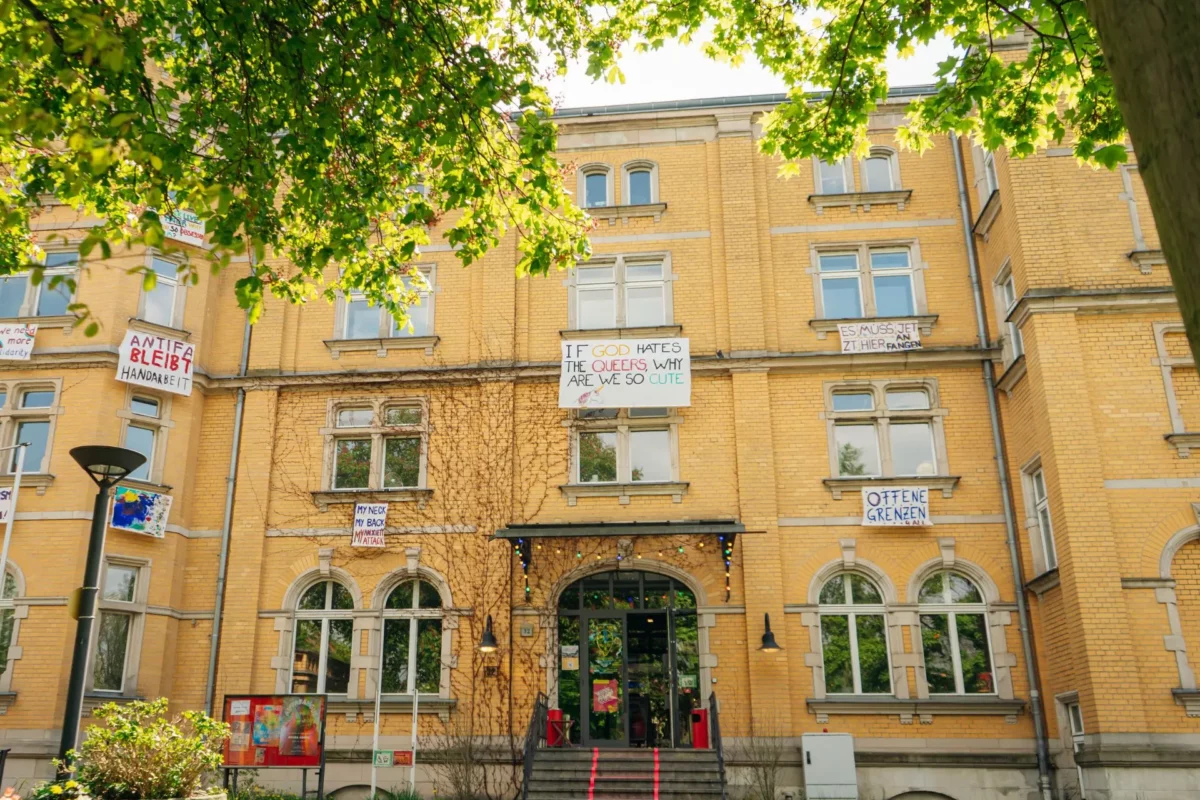This is an article which was never published on theleftberlin.com because of other things which happened on the same day. After Israel started bombing Gaza into the stone age, we concentrated all our energies on reporting the slaughter and the clampdown on protest in Berlin. I have finally found the time to complete this report, which I think is worth reading not least because Varoufakis embodies a degree of hope on the Left, including the solidarity which he has shown to Gaza.
DiEM25 was set up by Yannis Varoufakis and others at the Volksbühne in Berlin in February 2016. Reporting the launch for Philosophy Football, I noted the following: “Promising a message of hope to ‘people who don’t believe in politics’, he spoke of a broad transnational movement aimed at democratising Europe before it disintegrates.”
6½ years on, watching Varoufakis and Turkish journalist Ece Temelkuran speak in the Theater in Delphi in Berlin, the audience was encouraged to still feel hopeful, even though our side has suffered serious defeats in the intervening years. At the same time, Varoufakis and Temelkuran warned against being optimistic, saying instead that we should instead have hope and faith.
By chance, I attended this meeting directly after spending a couple of days with my father. My father is a man of great faith – he was a Methodist local preacher for a long time, and has been a member of the British Labour Party for over 60 years. He is an anti-racist who would love the world to be a better place. But even he is giving up on hope.
At tonight’s meeting, people who don’t believe in politics were largely absent. Both speakers acknowledged that they were speaking to a room of activists. While the launch meeting at the Volksbühne made serious efforts to try and address a potential new audience, tonight’s meeting was aimed at galvanising the already committed and preparing for DiEM25’s campaign in next year’s EU elections.
A blistering attack on capitalism
Both speakers spoke eloquently about the problems of modern capitalism – the wars, the attack on the environment, the tragic experience of refugees, hundreds of whom, Varoufakis said, had been murdered by the Greek coastguard. There was even a brief mention of the uprising in Gaza that same morning, although it wasn’t quite clear whether this was seen as a moment of hope or of tragedy.
Varoufakis did not hold back from naming names, saying – as he did 6½ years ago – that social democracy was no longer a progressive force. He blamed this largely on neoliberalism, saying that there was no longer any room for progressive reforms. The social democrats, the Greens, and even die LINKE were attempting to resuscitate capitalism, when capitalism was part of the problem.
Addressing the EU (the meeting’s title was “The EU is failing. What should we do?”), he compared the European Union to OPEC, arguing that just as OPEC acts against the interests of most people who live in oil producing countries, the EU is a cartel which has missed its last chance of reforming itself. Here, he went further than the DiEM25 founding conference, which invested quite a bit of hope in the possibilities of making the EU implement progressive politics.
Temelkuran was a little more circumspect. She wanted to hope in at least the possibilities of reform because how else will you be able to implement change? She also appealed for humanity to act with more compassion. Recounting a recent holiday near the Greek fires, she was appalled to have seen wind surfers blithely carrying on their fun as if nothing was happening.
Similar sentiments were expressed in one of the first contributions from the floor – a Norwegian Christian who wanted the state to prevent people to consuming too much, because “I can afford to buy new clothes every week, but poor people can’t”. This appeal to people to be nicer effectively excludes those who have been excluded by poverty, and sees change as being something that is bestowed on us by a benevolent state and nice rich people.
Strategies for Change
Whereas the meeting was strong in condemning the problems that we face, it was much weaker at explaining why the problems are there, and – most importantly – how they can be solved. Varoufakis rightly blamed capitalism for poverty, war, and environmental destruction, but when asked how we could get rid of capital, his answer was: “the biggest enemy of capitalism is capital itself”.
According to Varoufakis’s theory, capital is so illogical that it will end up collapsing. This is arguably a variation on Marx and Engels’ argument in the Comminist Manifesto: “The advance of industry, whose involuntary promoter is the bourgeoisie, replaces the isolation of the labourers, due to competition, by the revolutionary combination, due to association … What the bourgeoisie therefore produces, above all, are its own grave-diggers.”
There are two significant difference, though. Firstly, Marx and Engels continuously argued the primacy of class (the opening line of the Manifesto is “The history of all hitherto existing society is the history of class struggles”). The gravedigger cited by Marx and Engels is the organised working class. Varoufakis (and Temelkuran) were much more vague both about who is able to implement change and how.
Instead, Varoufakis posited the idea of DiEM25 as a surfer, waiting for the next wave. As far as I understand this strategy, all that we need to do is to carry on repeating the correct explanations for what is happening, and then, some time, people will be so sick of the disasters created by capitalism, they will come over to us (whoever “we” are).
What was entirely missing from the analysis was any explanation of why the Left should benefit from the implosion of capitalism. Recent experiences from France to the Netherlands (via Germany, where the AfD is currently polling at over 20%) shows that if the Left just sits back and waits for the next wave, the Fascist Right may actively try to profit from the resulting disorientation.
When did we have the chance to succeed?
To illustrate his point, Varoufakis listed five years in which we failed. In these years, he argued, there was an opportunity for our side to change society, but each time, we failed to meet the challenge. He didn’t add much more explanation, but the five years in which Varoufakis had most hope are 1929, 1945, 1968, 1981, and 2018.
Looking at this list, it is interesting to note that only one of these five years saw serious social upheaval (in Europe at least, which was the focus of this meeting). In 1929, the crash of the US stock markets fuelled the Great Depression, and caused more despair than hope. People felt unable to defend their own conditions, let alone fighting for a new society.
In 1945, we did see some significant reforms, like the formation of the NHS, which were granted by a ruling class which feared social protest. Young Tory MP Quinton Hogg (later Lord Hailsham) said in 1943: “If you don’t give the people social reform, they will give you social revolution.” And yet these protests by and large did not take place, and Britons failed to link up with the massive decolonial process in Britain’s former colonies.
1981 saw the third year of the Thatcher government in Britain, the second year of the Reagan government in the US and the election of the socialist Francois Mitterand in France. Each government would herald in neoliberal policies, and though they were met with riots and individual strikes, they were able to crush any opposition.
2018 is equally memorable for crisis rather than resistance. Again this was during a period when the Left did offer some beacons of hope – from the campaigns of Jeremy Corbyn and Bernie Sanders to lead their party’s election campaign to the relative electoral success of Podemos and Varoufakis’s SYRIZA.
But when asked to explain these failures, Varoufakis put them down to individual acts of treachery and error. The leaders of SYRIZA and Podemos sabotaged their party’s radicalism. Bernie Sanders should have left the Democrats. This explains to a degree what happened, but not really why it happened, or how the Left can avoid making the same mistakes in the future.
Where does hope lie?
Which leaves us with 1968. These were indeed days of hope, with street fighting and mass demonstrations East and West. But the most significant event in 1968 was not the “night of the barricades” in Paris on May 10th, but the general strike the next day which involved 10 million workers – the largest general strike in history.
The French strike suggests an answer to one of the largest reasons for Varoufakis’s pessimism. His argument that social democracy is no longer able to deliver is mainly based on the fact that Jeff Bezos is able to skim 40% off each Amazon transaction, and that no-one is able to stand up to Bezos in the way that they could fight old-fashioned capitalism.
Now, I don’t know if you’ve noticed, Yannis, but there has been a wave of strikes in Amazon recently, both in the USA and in the UK. And however the superstructure of capitalism may have changed in the past few decades, one thing remains the same. Workers produce everything from which capitalists make profit. So if our side stop working, their side – including Jeff Bezos – stop profiting from our labour.
In contrast, the solution offered by Temelkuran was some sort of social contract. Varoufakis rejected this, saying a social contract was no longer possible as this required people like Bezos being willing to negotiate with trade unions. But even in the past, the social contract was a pact not between bosses and unions but between bosses and union leaders who called on their members to accept wage restraints and attacks on their working conditions.
Varoufakis’s preferred solution of a Green New Deal has a similar weakness. Firstly, he overestimates the progressive nature of Roosevelt’s New Deal in the 1930s and ignores the fact that most gains were the result of militant trade union action. And he falls into the same trap as the social democrats whom he criticizes for wanting to negotiate with intransigent capital.
The Elephant in the Room
What is missing from Varoufakis’s analysis is any sort of agency from people who do not attend expensive meetings in old Berlin theatres. When a contributor attacked the speakers for their Eurocentrism, they conceded the point, saying that this was the title of the meeting, but they either ignored or did not understand the main point being made.
When the contributor asked why they hadn’t talked about uprisings in the Global South such as the recent one in Burkina Faso, Varoufakis’s answer was that the crisis in Africa is the result of political decisions taken in Europe and Washington, that any fight against the exploitation of Africa must also take place in the North. He argued: “There is a class war going on and internationalism is the only way”.
He is right, but internationalism does not consist of one way traffic. People in the Global South are not waiting for Europeans to stand up to big business – they are deposing their Western-imposed rulers, and fighting back in Gaza despite impossible odds. The first step towards building international resistance is to show solidarity with these struggles.
At the same time, we should continue to fight where we are. Speakers from the podium and the audience discussed whether the recent fight by Deutsche Wohnen & Co (DWE) to expropriate Berlin’s big landlords was a success or a failure. Seeing the fight as a total defeat seemed to fit the speakers’ pessimism, but they did have one valid point. Since the vote of the 59.1% was ignored, there has been insufficient discussion about why we lost and how we can win next time.
But this sort of thoughtful analysis was largely missing at this meeting. The idea that our side chooses a strategy, that we learn from past mistakes, that the role of the organised Left is not to wait for the right wave, but to do what it can to make the next wave as large as possible – none of this was seen as part of our purview.
It was inspiring to see so many people come together with the joint desire of a better world. We now need a much more serious discussion about how we can make this change, and how we can gain the necessary numbers to make sure that our next fight is successful.




